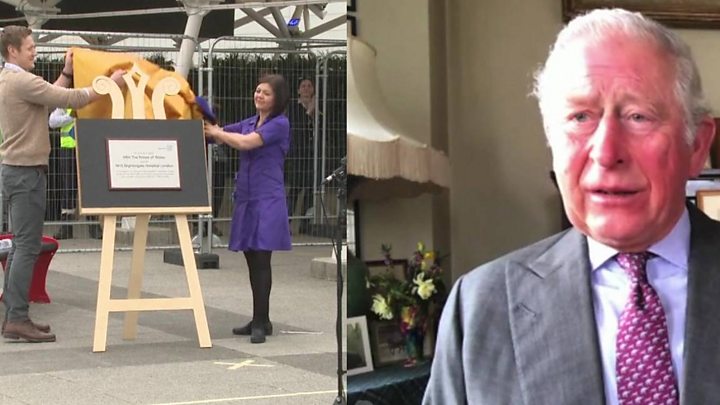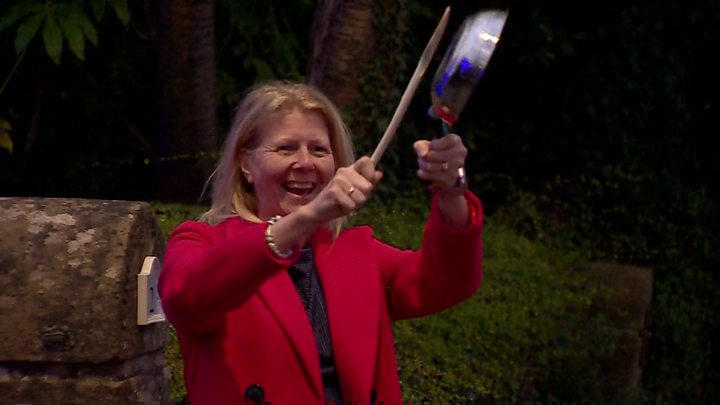Media playback is unsupported on your device
The first of the government’s emergency field hospitals to treat coronavirus patients has opened in east London’s ExCel centre.
The temporary NHS Nightingale Hospital is able to hold as many as 4,000 patients and will be staffed by NHS medics with help from the military.
Similar hospitals are planned across the UK, including in Cardiff, Glasgow, Manchester, Harrogate and Bristol.
It comes as Buckingham Palace announced the Queen is to address the nation.
The specially recorded speech about the coronavirus outbreak will be broadcast on Sunday at 20:00 BST.
The number of people who have died with coronavirus in the UK has increased by 684, latest figures show.
The Department of Health said that as of 17:00 BST on 2 April, the total number of deaths is now 3,605, up from 2,921. There are 38,168 confirmed cases.
In Scotland, the number of deaths has risen by 46, while in Wales a further 24 people died. In NI, the number of people who died with coronavirus has risen by 12.
Meanwhile, Prime Minister Boris Johnson, who announced he had contracted the virus last Friday, says he will carry on self-isolating after continuing to display mild symptoms of the virus including a high temperature.
The ExCel exhibition space – usually used for large events such as Crufts and Comic Con – was transformed into a hospital in just nine days.
It is the first of several Nightingale Hospitals planned in England, with the latest announcement that two will be built at the University of the West of England in Bristol and the Harrogate Convention Centre.
Others are due to open at Birmingham’s National Exhibition Centre and Manchester’s Central Complex.
In Wales, more than 6,000 extra beds are being set up in temporary hospitals – many in sports and leisure facilities, including Cardiff’s Principality Stadium.
In Scotland, a temporary hospital is being built at Glasgow’s Scottish Events Campus (SEC). It could have capacity for as many as 1,000 beds and will be named the NHS Louisa Jordan after a nurse who served in Serbia during World War One.
And Belfast City Hospital’s tower block will become Northern Ireland’s first Nightingale hospital with 230 beds.
Prince Charles officially opened the new hospital with a message paying tribute to NHS staff via video link from his home on the royal Balmoral estate in Scotland.
Speaking following seven days of self-isolation after being diagnosed with the virus, he called it “a spectacular and almost unbelievable feat of work”.

Media playback is unsupported on your device
It shows “how the impossible could be made possible and how we can achieve the unthinkable through human will and ingenuity,” he added, saying: “In this dark time, this place will be a shining light.”
London’s Nightingale hospital initially has 500 beds in place, with space for another 3,500. It will care for patients with the virus in intensive care who have been transferred from other London hospitals.
Staff from across the NHS will be working there, including student nurses, medical students who have started work early and former doctors, nurses and other staff who have come out of retirement.
Image copyright
PA Media
Officials, including Health Secretary Matt Hancock, had to stand on markers to follow social distancing rules
Image copyright
PA Media
The Prince of Wales sent a video message from his home in Scotland, where he has been recovering from the virus
Image copyright
Reuters
Military personnel helped to build the 80 wards in the new hospital
Also at the ceremony were Health Secretary Matt Hancock – who also recently came out of quarantine after having the virus – England’s chief nursing officer, Ruth May, and the head of NHS Nightingale, Prof Charles Knight.
Ms May said it was “absolutely fitting” that the hospital was named after Florence Nightingale, who was an “iconic nursing leader of her time” and a “pioneer for infection control”.
Mr Hancock said the construction of the hospital was “testament to the work and the brilliance of the many people involved”, and it showed the “best of the NHS”.
“In these troubled times with this invisible killer stalking the whole world, the fact that in this country we have the NHS is even more valuable than before,” he said.
‘Like a Heathrow terminal full of beds’
By BBC News correspondent Angus Crawford
There were plenty of high-viz vests, but an equal amount of combats and the occasional suit and tie. Some carried computers, others electric drills.
They pushed trolleys of blankets, pallets of wood and wheeled hi-tech scanning equipment.
The range of staff working on the Nightingale is extraordinary. Military personnel stand in small groups discussing logistics, while carpenters speaking Portuguese build the new temporary pharmacy, senior medics design and standardise each cubicle with space for a ventilator and computer terminal, outlets for oxygen, and alarm-call button.
I’ve seen a brand new hospital – which may eventually become the biggest in the country – rise from from what are basically two aircraft hangers.
Imagine Terminal 5 at Heathrow airport full of beds and you are nearly there.
One man involved in the vital task of installing liquid oxygen tanks, with dark rings around his eyes, told me proudly they’d done a 12-week project in four days. It is an incredible achievement.
It was celebrated today by Prince Charles with a “lockdown” royal visit and a virtual ribbon cutting.
Earlier, amid controversy over the roll-out of testing for coronavirus in the UK, Mr Hancock said the government had “a huge amount of work to do” to meet its target of 100,000 tests a day by the end of April.
Following confusion about whether the target was just for England or for the whole of the UK, Mr Hancock confirmed it was for the whole of the UK.
The 100,000 could include both swab tests, that check if someone has the virus, and antibody blood tests, to check if someone has had the virus recently – but which have not yet come into widespread use.
Mr Hancock said he was not relying on new antibody blood tests to meet the goal – and it was possible they could all be swab tests. Labour has called for more detail on the plan.

Media playback is unsupported on your device
On Thursday, there was capacity for 12,799 daily tests in England – although just 11,764 people were tested. The government’s target by mid-April had been to test 25,000 per day.
In other developments:
- Teachers in England will be asked to assess the grades they think pupils would have achieved in cancelled GCSE and A-level exams. This will be used by exam boards to decide results – along with a ranking by ability of pupils in each subject in a school, also judged by teachers
- 560 new ventilators have been manufactured following a call for help from industry
- The BBC has announced it will offer the biggest education push in its history to help parents and children in virus lockdown
- A 36-year-old NHS nurse has died after spending weeks in intensive care with coronavirus
- Heathrow will close one of its runways next week as air traffic continues to fall
- On Thursday evening, people across the UK took part in a second “Clap for Carers” tribute, saluting NHS staff and other key workers.
